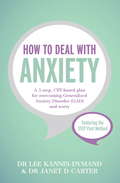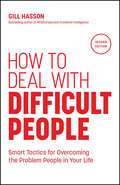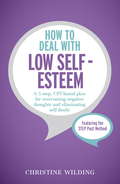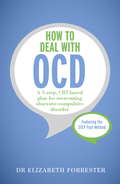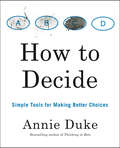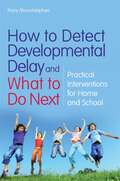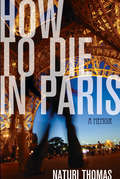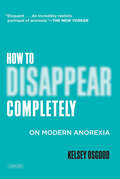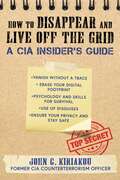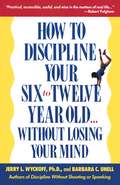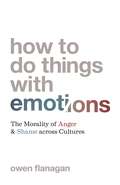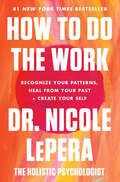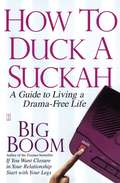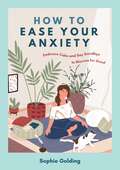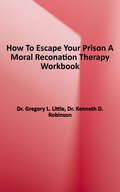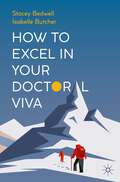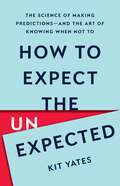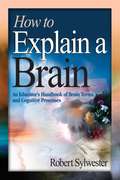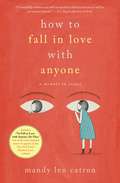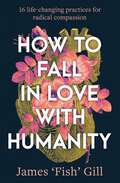- Table View
- List View
How to Deal with Anxiety: A 5-step, CBT-based plan for overcoming generalized anxiety disorder (GAD) and worry
by Janet D Carter Lee Kannis-DymandEveryone feels anxious from time to time, and worry is a natural part of life. But it is all too common to allow concerns about our health, our security, our relationships or our place in the world to become a negative cycle and a burden. Anxiety gets called GAD when the worry is repetitive, becomes associated with a variety of emotional and physical symptoms, and begins to impact upon our ability to enjoy life. If these problems sound familiar to you, this book will provide you with practical help to deal with and overcome the problem.By picking this book up you've taken the first stride. Now, using the STEP system - a structured, CBT-based approach that delivers both support and proven techniques for beating anxiety - you can begin to transform your daily life. Written by an expert team with many years of clinical experience, this book will help you get a better understanding of your anxiety and what keeps it going, tackle negative thoughts and behaviour, and progress to a healthier, happier outlook - without fear of setbacks or relapse.
How to Deal with Anxiety: A 5-step, CBT-based plan for overcoming generalized anxiety disorder (GAD) and worry
by Janet D Carter Lee Kannis-DymandEveryone feels anxious from time to time, and worry is a natural part of life. But it is all too common to allow concerns about our health, our security, our relationships or our place in the world to become a negative cycle and a burden. Anxiety gets called GAD when the worry is repetitive, becomes associated with a variety of emotional and physical symptoms, and begins to impact upon our ability to enjoy life. If these problems sound familiar to you, this book will provide you with practical help to deal with and overcome the problem.By picking this book up you've taken the first stride. Now, using the STEP system - a structured, CBT-based approach that delivers both support and proven techniques for beating anxiety - you can begin to transform your daily life. Written by an expert team with many years of clinical experience, this book will help you get a better understanding of your anxiety and what keeps it going, tackle negative thoughts and behaviour, and progress to a healthier, happier outlook - without fear of setbacks or relapse.ABOUT THE SERIESEveryone feels overwhelmed sometimes. When that happens, you need clarity of thought and practical advice to progress beyond the problem. The How To Deal With series provides structured, CBT-based solutions from health professionals and top experts to help you deal with issues thoroughly, once and for all. Short, easy to read, and very reassuring, these books are your first step on a pathway to a happier future. They are perfect for self-directed use and are designed so that medical professionals can prescribe them to patients.
How to Deal with Difficult People: Smart Tactics for Overcoming the Problem People in Your Life
by Gill HassonDon't let problem people get to you! Whether it's a manager who keeps moving the goal posts, an uncooperative colleague, negative friend, or critical family member, some people are just plain hard to get along with. Often, your immediate response may be to shrink or sulk, become defensive or attack. But there are smarter moves to make when dealing with difficult people. This book explains how to cope with a range of situations with difficult people and to focus on what you can change. This book will help you to: Understand what makes difficult people tick and how best to handle them Learn ways to confidently stand up to others and resist the urge to attack back Develop strategies to calmly navigate emotionally-charged situations Deal with all kinds of difficult people — hostile, manipulative and the impossible Know when to choose your battles, and when to walk away Why let someone else's bad attitude ruin your day? This second edition of How to Deal With Difficult People arms you with all the tools and tactics you need to handle all kinds of people — to make your life less stressful and a great deal easier.
How to Deal with Low Self-Esteem: A 5-step, CBT-based plan for overcoming negative thoughts and eliminating self-doubt
by Christine WildingEveryone can identify with feelings of uncertainty. To worry about our status in the world and to fear that we are not living up to our potential is a common and understandable concern. But when our self-esteem becomes low our our estimation of ourselves becomes over-critical, it is all too common to let negative feelings become a burden. If this sound familiar to you, this book will provide you with practical help to deal with and overcome the problem.By picking this book up you've taken the first stride. Now, using the STEP system - a structured, CBT-based approach that delivers both support and proven techniques for defeating low self-esteem - you can begin to transform your daily life. Written by an expert author with many years of clinical experience, this book will help you get a better understanding of your sense of self, tackle negative thoughts and behaviour, and progress to a healthier, happier outlook - without fear of setbacks or relapse.ABOUT THE SERIESEveryone feels overwhelmed sometimes. When that happens, you need clarity of thought and practical advice to progress beyond the problem. The How To Deal With series provides structured, CBT-based solutions from health professionals and top experts to help you deal with issues thoroughly, once and for all. Short, easy to read, and very reassuring, these books are your first step on a pathway to a happier future. They are perfect for self-directed use and are designed so that medical professionals can prescribe them to patients.
How to Deal with OCD: A 5-step, CBT-based plan for overcoming obsessive-compulsive disorder
by Elizabeth ForresterOCD, or obsessive compulsive disorder, is a common and difficult condition characterised by intrusive thoughts which produce worry and the compulsive desire to carry out repetitive behaviours aimed at reducing anxiety. OCD symptoms can range from mild to severe, and can really impact upon our mental health and ability to enjoy life. Recovery from OCD is possible, however.By picking this book up you've taken the first stride. Now, using the STEP system - a structured, CBT-based approach that delivers both support and proven techniques for combating obsessive thoughts - you can begin to transform your daily life. Written by an expert author with many years of clinical experience, this book will help you get a better understanding of your OCD, take practical steps to progress to a healthier, happier outlook - without fear of setbacks or relapse.ABOUT THE SERIESEveryone feels overwhelmed sometimes. When that happens, you need clarity of thought and practical advice to progress beyond the problem. The How To Deal With series provides structured, CBT-based solutions from health professionals and top experts to help you deal with issues thoroughly, once and for all. Short, easy to read, and very reassuring, these books are your first step on a pathway to a happier future. They are perfect for self-directed use and are designed so that medical professionals can prescribe them to patients.
How to Decide: Simple Tools for Making Better Choices
by Annie DukeThrough a blend of compelling exercises, illustrations, and stories, the bestselling author of Thinking in Bets will train you to combat your own biases, address your weaknesses, and help you become a better and more confident decision-maker.What do you do when you're faced with a big decision? If you're like most people, you probably make a pro and con list, spend a lot of time obsessing about decisions that didn't work out, get caught in analysis paralysis, endlessly seek other people's opinions to find just that little bit of extra information that might make you sure, and finally go with your gut. What if there was a better way to make quality decisions so you can think clearly, feel more confident, second-guess yourself less, and ultimately be more decisive and be more productive? Making good decisions doesn't have to be a series of endless guesswork. Rather, it's a teachable skill that anyone can sharpen. In How to Decide, bestselling author Annie Duke and former professional poker player lays out a series of tools anyone can use to make better decisions. You'll learn: • To identify and dismantle hidden biases. • To extract the highest quality feedback from those whose advice you seek. • To more accurately identify the influence of luck in the outcome of your decisions. • When to decide fast, when to decide slow, and when to decide in advance. • To make decisions that more effectively help you to realize your goals and live your values.Through interactive exercises and engaging thought experiments, this book helps you analyze key decisions you've made in the past and troubleshoot those you're making in the future. Whether you're picking investments, evaluating a job offer, or trying to figure out your romantic life, How to Decide is the key to happier outcomes and fewer regrets.
How to Design and Report Experiments
by Andy Field Dr Graham J HoleHow to Design and Report Experiments is the perfect textbook and guide to the often bewildering world of experimental design and statistics. It provides a complete map of the entire process beginning with how to get ideas about research, how to refine your research question and the actual design of the experiment, leading on to statistical procedure and assistance with writing up of results. While many books look at the fundamentals of doing successful experiments and include good coverage of statistical techniques, this book very importantly considers the process in chronological order with specific attention given to effective design in the context of likely methods needed and expected results. Without full assessment of these aspects, the experience and results may not end up being as positive as one might have hoped. Ample coverage is then also provided of statistical data analysis, a hazardous journey in itself, and the reporting of findings, with numerous examples and helpful tips of common downfalls throughout. Combining light humour, empathy with solid practical guidance to ensure a positive experience overall, Designing and Reporting Experiments will be essential reading for students in psychology and those in cognate disciplines with an experimental focus or content in research methods courses.
How to Detect Developmental Delay and What to Do Next: Practical Interventions for Home and School
by Mary Mountstephen Barbara Pheloung Lucy Smith Agnieszka Olechowska Elvie BrownIf a child is not meeting expected milestones it can be a source of great anxiety for parents and teachers. This forthright guide offers practical advice on how to recognize the signs of developmental delay, address difficulties effectively, and help the child to flourish. Mary Mountstephen presents a practical approach to dealing with developmental delay, equipping readers with the knowledge, understanding and tools to tackle problems successfully. By clearly explaining how children develop, drawing on the expertise of a number of specialists in the field and detailing straightforward interventions, the author enables parents and teachers to identify a wide range of problems and empowers them with the information they need to take action. Concise and accessible, this book provides a wealth of useful advice on how to address developmental delay, and will prove invaluable to parents, teachers and other professionals working with children.
How to Develop Your Children's Creativity
by Reynold BeanA guide to help parents teach their children to become more flexible and adaptive thinkers in an ever-changing world.
How to Die in Paris: A Memoir
by Naturi ThomasHow to Die in Parisis an edgy, poetic, often darkly comic, memoir of a young middle-class black woman who escapes a tortured past in New York to pursue a new life in Europe-only to find herself broke, desperate, and contemplating suicide on the streets of Paris. Penniless, scared, and hoping for rescue, Thomas turns to a series of unlikely male suitors: an impoverished Italian who exposes her to the reality of immigrant struggle, a fast-talking squatter who lures her into Paris’s street youth culture, and a beautiful Tunisian who takes her home . . . only to introduce her to a world of pain. Each encounter awakens in her memories from her childhood-memories of the abuse and racism she experienced at the hands of her mother-and forces her to confront the darkness in her past, even as she struggles to survive in the present. Though the trials she faces in Paris are often harrowing, Thomas is anything but self-pitying, often culling humor from gritty moments, and she finds goodness in the small blessings that come her way: a library that offers warmth and escape, a sandwich abandoned in a phone booth, the generosity of strangers, and especially, the wonder of Paris itself. Ultimately, being homeless in the City of Light frees her of the denial and defenses that have been holding her back all her life-revealing a broader world too beautiful to leave.
How to Disappear Completely: On Modern Anorexia
by Kelsey OsgoodAt fourteen, Kelsey Osgood became fascinated by the stories of women who starved themselves. She devoured their memoirs and magazine articles, committing the most salacious details to memory to learn what it would take to be the very best anorexic. When she was hospitalized at fifteen, she found herself in an existential wormhole: how can one suffer from something one has actively sought out? With attuned storytelling and unflinching introspection, Kelsey Osgood unpacks the modern myths of anorexia as she chronicles her own rehabilitation. How to Disappear Completely is a brave, candid and emotionally wrenching memoir that explores the physical, internal, and social ramifications of eating disorders.
How to Disappear and Live Off the Grid: A CIA Insider's Guide
by John KiriakouWith an experienced CIA officer as your teacher, you&’ll gain the knowledge and necessary tools to protect yourself and the ones you love.No matter where we go, we leave tracks and clues of our existence without even knowing. Our electronic footprint becomes our invisible trail. In this day in age where the world seems to be at our fingertips and social media plays a huge role in our daily lives, it&’s hard not to leave part of our digital selves for others to find.Whether you&’re fascinated by the idea of disappearing, want to erase your digital footprint, or simply concerned about your safety and privacy, knowing how to become invisible is a survival skill that will come in handy.Through the easy-to-follow instructions, tips, tricks, and professional anecdotes in How to Disappear and Live off the Grid: A CIA Insider's Guide, you&’ll learn to vanish without a trace from John Kiriakou, a former CIA counterterrorism officer and senior investigator for the Senate Foreign Relations Committee responsible for the capture of Abu Zubaydah.
How to Discipline Your 6-12
by Barbara C. Unell Jerry WyckoffDiscipline Without Shouting Or Spanking became a best-seller by proving practical, effective advice on common behavioral problems to parents of children under six. Here the authors adapt their winning formula for older youngsters.From the Trade Paperback edition.
How to Do Things with Emotions: The Morality of Anger and Shame across Cultures
by Owen FlanaganAn expansive look at how culture shapes our emotions—and how we can benefit, as individuals and a society, from less anger and more shameThe world today is full of anger. Everywhere we look, we see values clashing and tempers rising, in ways that seem frenzied, aimless, and cruel. At the same time, we witness political leaders and others who lack any sense of shame, even as they display carelessness with the truth and the common good. In How to Do Things with Emotions, Owen Flanagan explains that emotions are things we do, and he reminds us that those like anger and shame involve cultural norms and scripts. The ways we do these emotions offer no guarantee of emotionally or ethically balanced lives—but still we can control and change how such emotions are done. Flanagan makes a passionate case for tuning down anger and tuning up shame, and he observes how cultures around the world can show us how to perform these emotions better.Through comparative insights from anthropology, psychology, and cross-cultural philosophy, Flanagan reveals an incredible range in the expression of anger and shame across societies. He establishes that certain types of anger—such as those that lead to revenge or passing hurt on to others—are more destructive than we imagine. Certain forms of shame, on the other hand, can protect positive values, including courage, kindness, and honesty. Flanagan proposes that we should embrace shame as a uniquely socializing emotion, one that can promote moral progress where undisciplined anger cannot.How to Do Things with Emotions celebrates the plasticity of our emotional responses—and our freedom to recalibrate them in the pursuit of more fulfilling lives.
How to Do the Work: Recognize Your Patterns, Heal from Your Past, and Create Your Self
by Dr. Nicole LePera#1 NEW YORK TIMES BESTSELLER · INSTANT INTERNATIONAL BESTSELLERFrom Dr. Nicole LePera, creator of "the holistic psychologist"—the online phenomenon with more than two million Instagram followers—comes a revolutionary approach to healing that harnesses the power of the self to produce lasting change.As a clinical psychologist, Dr. Nicole LePera often found herself frustrated by the limitations of traditional psychotherapy. Wanting more for her patients—and for herself—she began a journey to develop a united philosophy of mental, physical and spiritual wellness that equips people with the interdisciplinary tools necessary to heal themselves. After experiencing the life-changing results herself, she began to share what she’d learned with others—and soon “The Holistic Psychologist” was born.Now, Dr. LePera is ready to share her much-requested protocol with the world. In How to Do the Work, she offers both a manifesto for SelfHealing as well as an essential guide to creating a more vibrant, authentic, and joyful life. Drawing on the latest research from a diversity of scientific fields and healing modalities, Dr. LePera helps us recognize how adverse experiences and trauma in childhood live with us, resulting in whole body dysfunction—activating harmful stress responses that keep us stuck engaging in patterns of codependency, emotional immaturity, and trauma bonds. Unless addressed, these self-sabotaging behaviors can quickly become cyclical, leaving people feeling unhappy, unfulfilled, and unwell. In How to Do the Work, Dr. LePera offers readers the support and tools that will allow them to break free from destructive behaviors to reclaim and recreate their lives. Nothing short of a paradigm shift, this is a celebration of empowerment that will forever change the way we approach mental wellness and self-care.
How to Duck a Suckah
by Big BoomThe Bodyguard for Women's Hearts returns with brand-new tough-love advice for satisfying relationships and spiritual fulfillment. Some women have become so accustomed to the games and manipulations of men that they are virtually sitting ducks for all the suckahs out there. Every woman has to be able to recognize Mr. Wrong before she lets him into her heart. True love is definitely out there -- you just have to know where to look. In How to Duck a Suckah, Big Boom -- a former pimp, player, and hustler -- draws on his own sordid past to help women avoid traps, demand respect, and live a drama-free life. His overall message of self-empowerment proves that you can't be happy with anyone else unless you are happy with yourself.
How to Ease Your Anxiety: Embrace Calm and Say Goodbye to Worries for Good
by Sophie GoldingCalm your mind, ease your worries and quieten your thoughts with this stunning guide to living an anxiety-free life. Through simple tips and kind advice, this book will show you how to tune out racing thoughts and find mental tranquillity. So dive into these pages and give yourself the gift of a calmer mind.
How to Ease Your Anxiety: Embrace Calm and Say Goodbye to Worries for Good
by Sophie GoldingCalm your mind, ease your worries and quieten your thoughts with this stunning guide to living an anxiety-free life. Through simple tips and kind advice, this book will show you how to tune out racing thoughts and find mental tranquillity. So dive into these pages and give yourself the gift of a calmer mind.
How to Escape Your Prison: A Moral Reconation Therapy Workbook
by Gregory L. Little Kenneth D. RobinsonA Moral Reconation Therapy Workbook. Moral Reconation Therapy is a systematic, cognitive-behavioral, step-by-step treatment strategy designed to enhance self-image, promote growth of a positive, productive identity, and facilitate the development of higher stages of moral reasoning. The term moral reconation was chosen for this system because the underlying goal was to change conscious decision-making to higher levels of moral reasoning.
How to Excel in Your Doctoral Viva
by Stacey Bedwell Isabelle ButcherHow to excel in your doctoral viva offers an accessible guide to approaching and preparing for a PhD viva examination. The book explains what the viva is, how the process works, and what the purpose of the viva is. It guides the reader through the course of preparing for their viva examination, with chapters focusing on organisation to dealing with viva concerns. Contributions from over 25 academics ranging from critical care to theology provide a unique insight into the experiences of PhD candidates and examiners, and make this book an invaluable resource for students completing PhDs across the sciences.
How to Expect the Unexpected: The Science of Making Predictions—and the Art of Knowing When Not To
by Kit YatesA &“vivid, wide-ranging, and delightful guide&” (bestselling author Tim Harford) for understanding how and why predictions go wrong, with practical tips to give you a better chance of getting them right How can you be 100 percent sure you will win a bet? Why did so many Pompeians stay put while Mount Vesuvius was erupting? Are you more likely to work in a kitchen if your last name is Baker? Ever since the dawn of human civilization, we have been trying to make predictions about what the world has in store for us. For just as long, we have been getting it wrong. In How to Expect the Unexpected, mathematician Kit Yates uncovers the surprising science that undergirds our predictions—and how we can use it to our advantage. From religious oracles to weather forecasters, and from politicians to economists, we are subjected to poor predictions all the time. Synthesizing results from math, biology, psychology, sociology, medicine, economic theory, and physics, Yates provides tools for readers to understand uncertainty and to recognize the cognitive biases that make accurate predictions so hard to come by. This book will teach you how and why predictions go wrong, help you to spot phony forecasts, and give you a better chance of getting your own predictions correct.
How to Explain a Brain: An Educator's Handbook of Brain Terms and Cognitive Processes (1-off Ser.)
by Robert SylwesterNoted author Robert Sylwester offers educators and general readers his own definitions for terms used in the cognitive neurosciences. This unique look into the marvelous brain uses language and descriptions that are accessible to readers, even those with just a limited understanding of biology. Discover how our brain is organized and develops, and how educators can use this emerging understanding of cognition to enhance student learning and the school environment. This ready-reference guide to essential concepts and terms in cognitive neurosciences includes: -Nearly three hundred encyclopedic entries and cross references created to help educators understand key concepts about our brain's organization, development, and learning capabilities -Eleven newly created anatomic models and illustrations that focus on key brain systems and functions -References and recommended print and Internet resources How to Explain a Brain celebrates the brain in all its wonder and is sure to become a reference book of choice for teachers, instructional leaders, and teacher educators.
How to Fall in Love with Anyone: A Memoir in Essays
by Mandy Len Catron&“A beautifully written and well-researched cultural criticism as well as an honest memoir&” (Los Angeles Review of Books) from the author of the popular New York Times essay, &“To Fall in Love with Anyone, Do This,&” explores the romantic myths we create and explains how they limit our ability to achieve and sustain intimacy.What really makes love last? Does love ever work the way we say it does in movies and books and Facebook posts? Or does obsessing over those love stories hurt our real-life relationships? When her parents divorced after a twenty-eight year marriage and her own ten-year relationship ended, those were the questions that Mandy Len Catron wanted to answer. In a series of candid, vulnerable, and wise essays that takes a closer look at what it means to love someone, be loved, and how we present our love to the world, &“Catron melds science and emotion beautifully into a thoughtful and thought-provoking meditation&” (Bookpage). She delves back to 1944, when her grandparents met in a coal mining town in Appalachia, to her own dating life as a professor in Vancouver. She uses biologists&’ research into dopamine triggers to ask whether the need to love is an innate human drive. She uses literary theory to show why we prefer certain kinds of love stories. She urges us to question the unwritten scripts we follow in relationships and looks into where those scripts come from. And she tells the story of how she decided to test an experiment that she&’d read about—where the goal was to create intimacy between strangers using a list of thirty-six questions—and ended up in the surreal situation of having millions of people following her brand-new relationship. &“Perfect fodder for the romantic and the cynic in all of us&” (Booklist), How to Fall in Love with Anyone flips the script on love. &“Clear-eyed and full of heart, it is mandatory reading for anyone coping with—or curious about—the challenges of contemporary courtship&” (The Toronto Star).
How to Fall in Love with Humanity: 16 life-changing practices for radical compassion
by James 'Fish' GillOur wellbeing is ultimately founded on fulfilling relationships. Yet how effortlessly misunderstandings, disagreements and conflicts arise with those we care most about! Our political and legal systems promote an adversarial approach to resolution, and pop-psychology labels encourage us to pathologise those who have done us wrong. But the story of victim and villain has only ever deepened opposition. Without skills to mend our inevitable relationship ruptures, upsets prevail and disconnection deepens. No wonder loneliness is recognised globally as the next public health epidemic.By turns fierce and poetic, How to Fall in Love with Humanity delivers what every relationship eventually aches for: a practical roadmap to repair.You'll learn how to lead the way back to love when it goes missing, heal past hurts, mend current relationship upsets and prevent otherwise inevitable future conflicts, while developing your own invincible superpower: how to remain both 'unfuckwithable' and open-hearted in every way.
How to Fall in Love with Humanity: 16 life-changing practices for radical compassion
by James 'Fish' GillOur wellbeing is ultimately founded on fulfilling relationships. Yet how effortlessly misunderstandings, disagreements and conflicts arise with those we care most about! Our political and legal systems promote an adversarial approach to resolution, and pop-psychology labels encourage us to pathologise those who have done us wrong. But the story of victim and villain has only ever deepened opposition. Without skills to mend our inevitable relationship ruptures, upsets prevail and disconnection deepens. No wonder loneliness is recognised globally as the next public health epidemic.By turns fierce and poetic, How to Fall in Love with Humanity delivers what every relationship eventually aches for: a practical roadmap to repair.You'll learn how to lead the way back to love when it goes missing, heal past hurts, mend current relationship upsets and prevent otherwise inevitable future conflicts, while developing your own invincible superpower: how to remain both 'unfuckwithable' and open-hearted in every way.
